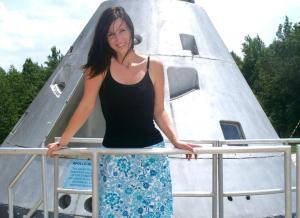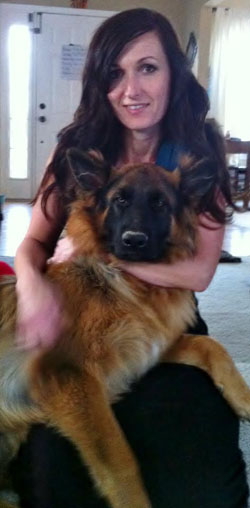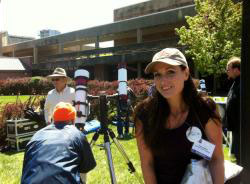



Interview to Dr. Karen
Jennings from the Astronomy Foundation
Interview by Rui Miguel Fernandes
Summary: What's happening in astronomy nowadays? - Super
interesting interview to a successful woman in the world of astronomy...
Let's find out a little more about her.
 Cosmos
- Tell us a little bit about yourself please.
Cosmos
- Tell us a little bit about yourself please.
Karen Jennings - I am currently the Vice President for the
Astronomy Foundation, a non-profit astronomy sciences advocacy and outreach
organization. The Astronomy Foundation's mission is to increase interest and
create enthusiasm for astronomy. For example, some of our work includes
promoting star parties for the public, attending and supporting
astronomy-related science and educational events. In addition, we are dedicated
to building our astronomy community by bringing together telescope-industry
expertise and resources to help promote and support astronomy awareness,
astronomy education, and create partnerships with educators and astronomy clubs.
Cosmos - When and why did you decided to
become an astronomer? What did you first want to be when you were a child?
Karen Jennings - Perspective. About five years ago, I noticed
that my family's activities were centered around video games, computers and TVs.
The only connection I felt was to a wifi device. We were over scheduled,
stressed and in desperate need of back to basics perspective. I had an
inexpensive 50mm refractor telescope from a toy store down in our basement. I
dusted it off, set it up on the back deck and pointed it at our moon. We loved
looking at all of the craters and seeing detail you cannot observe naked eye. We
pointed the telescope at the brightest object in the sky (thought it was a star)
and saw Jupiter and the Galilean moons! We were absolutely hooked! If we could
see Jupiter with a child's telescope, imagine what could we see with a better
one? Our first "real" telescope was an 8" Dobsonian mounted reflector. Aperture
fever set in and we added 16"+ telescopes to our inventory. Today, my husband is
an amateur telescope maker and my living room looks like a showroom for our
telescopes. I refuse to store them away because I feel they are works of art.
I wanted to be a dancer. I went Temple University to study Psychology and Dance
and earned a BA. With an emphasis in neuropsychology, I became active in
experimental psychology and began conducting, writing and presenting research. I
took a leave of absence from a PhD graduate program to start a family with my
husband.
Cosmos - Which are your hobbies?
Karen Jennings - I enjoy anything that involves moving your
body. I love running and strength training. I also enjoy dance, theater and
comedy.
 Cosmos
- Who is your lifetime's figure reference in this field and why?
Cosmos
- Who is your lifetime's figure reference in this field and why?
Karen Jennings - Carl Sagan. Carl Sagan's Cosmos introduced me
to the idea that we are all connected... “The nitrogen in our DNA, the calcium
in our teeth, the iron in our blood, the carbon in our apple pies were made in
the interiors of collapsing stars. We are made starstuff. "Pale Blue Dot" took
my breath away and I read it every time I need to gain perspective : "It has
been said that astronomy is a humbling and character-building experience. There
is perhaps no better demonstration of the folly of human conceits than this
distant image of our tiny world. To me, it underscores our responsibility to
deal more kindly with one another and to preserve and cherish the pale blue dot,
the only home we've ever known." — Carl Sagan, Pale Blue Dot: A Vision of the
Human Future in Space
Cosmos - Do you think we need more minds like
Carl Sagan to explain in a simple manner the complex matters of Astronomy to the
general public? Is there someone in the present that can do that?
Karen Jennings - We are fortunate to have people like Neil
deGrasse Tyson, Michelle Thaller and Brian Greene who popularize astronomy and
work to bring complicated science down to Earth for the general public. Neil
deGrasse Tyson engages the public in a way that excites people in wanting to
learn more about astronomy. Tyson is brilliant in taking complex astrophysics
and making it accessible and understandable to his audience. An example of this
would be his description of spaghettification in his book "Death by Black Hole"
which details the vertical stretching and horizontal compression of objects near
the strong gravitational field of a black hole.
Cosmos - People seem to be confused between
astronomy and astrology? Why? Will this ever end?
Karen Jennings - I don't think astrology will end anytime soon,
debunked or not. It provides entertainment, perhaps excuses for behavior, but I
believe it's pseudoscience. The idea that a position of a constellation relative
to the day and month you were born and a gravitational pull or electromagnetic
energy that predetermined your personality, will and destiny doesn't jive with
simple physics. How do astrologists reconcile the precession of the Earth?
Earth’s axis wobbled a bit, so the current position of zodiac objects are no
longer consistent with the tenets of astrology codified over two thousand years
ago.
 Cosmos
- Now the main question: what's up in astronomy nowadays that's is complety new
in your opinion and why?
Cosmos
- Now the main question: what's up in astronomy nowadays that's is complety new
in your opinion and why?
Karen Jennings - Large aperture amateur telescopes. The kind of
equipment that is available nowadays means that much more of the sky is
accessible than in the past. Big aperture, fast focal ratios, 100% degree field
of vision eyepieces make some very respectable yet affordable gear for the
amateur astronomer.
Cosmos - Do you think that the study of
astronomy will ever end?
Karen Jennings - The study of our universe will never die
because we are driven by a primal intrinsic desire to try and understand why and
how we are here. Astronomy as we know it is in its infancy. As technology
improves, so will the discoveries. Professional and amateur astronomers make new
discoveries every day. We are just now starting to scratch the surface of
exoplanet research.
Cosmos - What was, in your opinion, the major
breakthrough in astronomy these last few centuries?
Karen Jennings - The astronomical observations that proved
Einstein's General Theory of Relativity: Gravitational Lensing and Waves;
Expanding Universe; Black Holes.
Cosmos - Do you agree that social networks
like Facebook are benefical to the expansion of the astronomy's knowledge?
Karen Jennings - Social media is a very important tool for
astronomy outreach. These apps can help advertise and promote all things
astronomy outreach from local sidewalk astronomy events to larger star parties.
Every astronomy club should be employing social media to help create and spread
awareness of their organization and the outreach work they are engaged in.
For astronomy knowledge in general, it has been an amazing tool! Consider the
success of NASA's Mars Curiosity Rover with “its own” official twitter account.
Curiosity posted updates about its journey to Mars, and shared the step by step
preparations for the trip. The rover's landing was famously called "7 minutes of
terror”! Everyday people outside of NASA got to see images of Curiosity's view
of Mars.
Cosmos - Finally, what
message would you like to leave to those who are starting in the field ?
Karen Jennings - Welcome! Countless night sky wonders await you
my friend! Join your local or online astronomy club, go to a star party and
don't be afraid to ask questions. You don't need expensive equipment or
extensive knowledge of astrophysics. Start with simple sky charts and
binoculars. Best wishes and clear skies!
![]()
http://cosmos.pt
2003- -
Cosmos - Todos os direitos reservados
2003- -
Cosmos - All rights reserved
